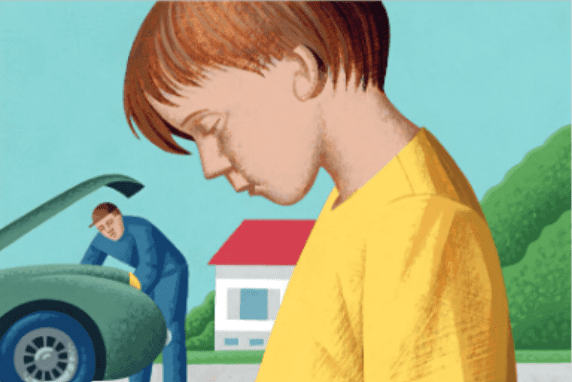Browsing at a bookstore, I pick up a glossy car magazine, drawn in by a photo of a pristine example of England’s finest racing machine: the Jaguar XK150. The grill is different from the 120, the wheels, too. Whitewalls are on both, but wire wheels were gone by ’57. Who on Earth would care about such an obscure detail? I know who.
My father was more interested in cars than people. Cars we could always discuss, but other kinds of conversation were much more difficult. He was raised in poverty in rural Colorado by parents who expected him to try panning for silver to supplement the family income when he was only 14. In his eyes, I was a spoiled child of privilege—privilege he’d created, by the way—attracted to the foolish luxury of pursuing a career in theater. When I quit a custodial job at a factory to play the lead in On the Town at a local dinner theater, he got angry, ignored me for weeks, and refused to see the production. According to him, serious people didn’t act in plays. I agonized over his disapproval, frequently avoiding communication after I left home to try my hand at a career in performance, and then writing him contentious letters, filled with my grievances with him, as well as the war in Vietnam, with the sole purpose of creating an oppositional front. Rarely did he respond.
Cars were our only common ground—a subject I learned about from him by spending hours at his side underneath the chassis of his prized Jaguar. Despite my resentment of the hours he’d make me work with him on Saturdays from the time I was 8 years old, I was fascinated by how he could replace the carburetor from his 1953 Jaguar XK120M—“never forget the M means modified!”—with the more aggressive four-barrel Weber, which would make the engine rumble with menace. As far as I could tell, readying his cars for race day was the one passion of his life.
Mostly our time together was wordless, interrupted only by an occasional order like “Get me a pack of smokes.” He’d hand me a quarter and point the way to the gas station three blocks away, home to a cigarette machine an 8-year-old could operate with impunity. Liberated by the chance to escape the tension between us, I’d walk the tree-canopied street, carefully avoiding any crack in the sidewalk lest I “break my mother’s back.” Once I’d arrived at the gas station, the pungent fragrance of charred, dirty oil greeted my nostrils, along with the ching-ching of the hose bell, summoning the attendant to the pumps. Sometimes I’d jump on that hose hard enough to make it go off myself—an accomplishment that irritated the attendants but delighted me.
As I shifted to my assigned task, my chubby face would peek back at me from the oil-stained mirror in the cigarette machine as it gobbled the quarter and spat unfiltered Chesterfields through the chute into my hand. I’d hold the pack like the most delicate of birds, taking care to make sure it was immaculate, with no sweat on the cellophane, no crumpling of the pack when I handed it to my father. I knew the slightest flaw would be met with another glare of disapproval.
On hot summer days, bubbles would form in the asphalt, and it was impossible to avoid the temptation to flatten every one as I walked back from the station. When I’d arrive home with the cigarettes intact, I’d admire the precision with which my father would remove the cellophane wrap and tear the foil opening. His absorption in the ritual of lighting the match, taking in a deep lungful of air, and letting out a sigh of smoke were my only reward—never a “thank you,” never a “good job,” just a pause in our usual routine with each other. Then more orders.
“Box wrench!” he’d bark. “No, not the crescent! Box wrench! 5/32!” If I accidentally clipped the toolbox with my knee, the deafening clang of falling wrenches would ring out. With my heart pounding, I’d try to spot the tool he wanted and hand it to him as soon as I could before his irritation deepened. Smoke would fire from his nostrils in one robust exhalation as the unfiltered butt hung from his lower lip. While tightening a bolt on the carburetor, he might nod slightly—a satisfactory substitute for a “thanks” in my mind. A smile would fill my cheeks, making them pink with delight. A Saturday saved!
It was on a Saturday, many years later that my own 5-year-old son was sick, so sick he couldn’t move, could barely breathe. He’d survived a liver transplant at age 4, but six months later had fallen victim to a post-transplant viral infection. Mom and Dad had come to visit, with the unspoken reason that this might be the last time they’d see him alive. My wife was paralyzed with fear and I was utterly exhausted. Even though we couldn’t bear the thought of leaving our boy alone, my parents insisted, “Go, get out, see a movie, escape for a while.” Robotically, we went to see a movie. I have no memory of being in a theater or driving home, but I do remember the scene in the house when we returned. My parents were holding quiet vigil while my son slept, his labored breathing the only sound as he lay with his head resting on my father’s lap.
Knowing that offering comfort was not his strong point, I felt the need to give my Dad some relief. “Wanna go downstairs?” I asked. “There’s a car auction on ESPN Classic.”
He looked up, and as he did, I noticed he’d been holding my son’s hand. “No,” he quietly intoned. “I don’t want to wake him. He needs his rest.”
I looked down at my father’s wrinkled hands, the leather paws that had once so deftly wrestled with those wrenches, and I recalled those long-lost Saturdays when I was so fearful of his presence, so hurt by his disapproval. Those hands, sculpted by nearly eight decades of life, cradled my boy’s tiny pale hands, reminding me of the promise of his own young life—if only he’d been given a chance—and of the possibilities for forgiveness.
Earlier that year, my father had sent me an almost indecipherable letter in handwriting that had degenerated with age and emphysema. “I may have disagreed with some of your choices, but you’re a really good father,” it said, adding another uncharacteristic bit of praise: “and a fine golfer.” It was his attempt to set things straight with me, and I replied with a peace offering of my own, a short note of thanks. It was sincere, but carefully measured.
More Saturdays passed, and over time my son made it. Dad didn’t. Age and unfiltered Chesterfields eventually took their toll. Seven years after my son had recovered, I received a call from Mom. “Dad died” was all she said. I sat on the edge of my bed, holding the phone in a loose grasp as tears streamed down my face. My son, now 12, heard the call and entered the room. “Whatsa matter, Dad?” he asked.
“Grandpa just died,” I told him with red-rimmed eyes.
He looked at me with puzzlement. “But you didn’t get along. Why are you crying?”
I gazed into my son’s face, wrapped my arms around him, and said, “Yeah, but he’s my Dad and your Grandpa. He was a good man.”
All the turmoil and rage I once felt suddenly dissolved inside me as I held my own son tight, aware of all my imperfections as a father, and shared this moment of loss with him. Now, looking at the car magazine transports me back to all those long-lost Saturdays with my father and his Jaguar. I know he’d have loved the article on that XK150.
Illustration by Adam Niklewicz
Richard Holloway
Richard Holloway, PhD, is a professor, associate chair of the Department of Family and Community Medicine, and associate dean for student affairs emeritus at the Medical College of Wisconsin. He maintains a practice as a licensed marriage and family therapist.













